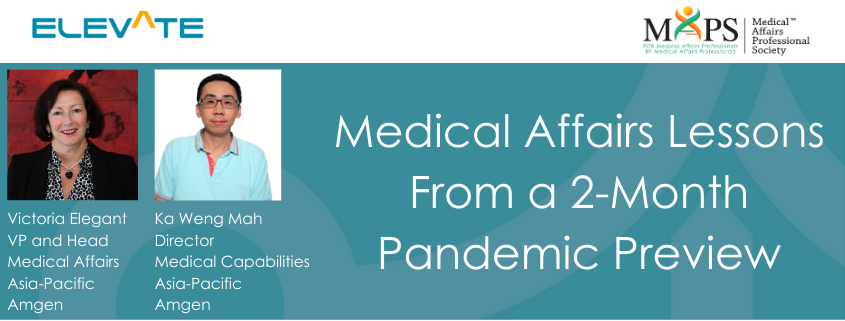Medical Affairs Lessons from a 2-Month Pandemic Preview
As VP and Head of the Asia-Pacific Medical Affairs function at Amgen, Victoria Elegant saw COVID-19 a full two months before colleagues in other parts of the world. In fact, in January 2020 as news of COVID-19 outbreaks in China reached beyond the country’s borders, Elegant was finishing a ski trip to Switzerland. “The second I got off the phone with our crisis team, I went out and bought masks and hand sanitizer,” she says. Elegant was traveling with what she describes as a “big, international group of doctors,” and remembers that at least half the group was amazed by her reaction. “I passed out masks, saying ‘You will need these,’” Elegant says. Here the Medical Affairs Professional Society (MAPS) speaks with Elegant and colleague Ka Weng Mah, Director of Medical Capabilities, Amgen Asia Pacific about the takeaways for the practice of Medical Affairs afforded by their front-row seats to the pandemic, and also about results of a recent Amgen survey of healthcare provider preferences.
MAPS: You talked a little about Europe’s reaction to news of the pandemic – what did you see when you returned home to Hong Kong?

Victoria Elegant, VP and Head of the Asia-Pacific Medical Affairs function at Amgen
Elegant: Healthcare professionals in Hong Kong knew what was coming. In Asia, we went through SARS and there is a culture of wearing masks if you are sick to protect other people. Even flying back to Hong Kong in January, everyone on the plane and in the airport was wearing masks. In the middle of it, it was intense – trying to figure out what we needed to do for our staff, for patients, how to continue clinical trials.
Mah: As early as in late Jan/early Feb, many people in Asia were even more progressive than the governments, with calls to close borders immediately. The majority, almost 98.8% in many Asian countries, also took the initiative to wear masks.
MAPS: So, effectively, you had a two-month head start on the pandemic compared with the rest of the world. Did this put you in a position to see early transformations in the practice of Medical Affairs?
Elegant: Even before the pandemic, we had seen that we needed to do things differently and had appointed a Medical Affairs digital lead in July 2019. So when hospitals suddenly wouldn’t let us do face-to-face healthcare provider interactions, in a way, we were lucky and perhaps a bit ahead of the game: We had already laid the foundation for digital.
Mah: Previously, we had aspirations to drive digital transformation but it was just experimental. Then with COVID, it meant squeezing years of work in one month. What we said is that every MSL can be e-MSL, every event can be an e-Event, and it was COVID-19 that hastened the transformation of our business – the future we were working towards, came today.
MAPS: On the organization side, digital transformation was driven by the realities of the pandemic, but did you see the same adoption from healthcare providers?
Elegant: China changed almost overnight. But Japan and Korea are conservative countries and change can be more challenging. Asia is still a face-to-face culture. For example, the more people you have in a meeting with an important person, the more you show respect. These were attitudes we had to work on. We saw that we needed to facilitate this change management and get stakeholders to accept a new way of doing things. Therefore, back in April we performed a systematic review of industry reports, followed by internal (MSL) and external (KOL) surveys, in order to identify and drive the necessary new ways of working in this peri-COVID era.
MAPS: And what do you see now in these countries?

Ka Weng Mah, Director of Medical Capabilities, Amgen Asia Pacific
Mah: We spent so much time educating and bringing people up to speed, then all of a sudden we had way more transformation than we could handle. Korea had practically no virtual interactions but were forced to adapt and flipped overnight and now they are embracing digital completely. Japan, as well, embraced digital but now many healthcare providers in Japan are already wanting to go back to face-to-face interactions. Perhaps there is a cultural element to this, but there’s no way we can go back. The new world will be a blended one. I think that for a more digitally open country like China, it will go 50percent digital or more, while countries like Japan and Korea may end up being somewhat less.
MAPS: There must have been some element of excitement watching these initiatives that had been moving along slowly suddenly gain momentum?
Elegant: We had to do this transformation overnight, working 24/7 to get capabilities and systems in place. Big corporations have their challenges with innovation but MSLs have to do their jobs and meetings had to go ahead. We spent a lot of time trying to support teams and engage with them and figure out how they could managethis We also had to support the teams to find a balance between the work that needs to get done and also keeping themselves mentally and physically healthy in the new way of working.
MAPS: Does all this work and all this dramatic transformation simply bring you back to the level capabilities you had before the pandemic or is there some benefit to these activities beyond simply learning how to do your old jobs in a new world?
Elegant: One of the things that’s emerged for us is patients as an even more important stakeholder. The COVID process has led to the realization that the healthcare system is set up for providers and not necessarily for patients. It’s super inconvenient – generally – to be a patient. And now we see there are things we can do to help – things like delivering clinical trials supplies to patients’ homes or providing a 6-month prescription instead of a 1-month prescription or providing an ongoing supply of medications to homes for chronic conditions. One of the big things to come out of this pandemic experience is how to work with patients to amplify their voice, especially in Asia where the patient voice hasn’t been so strong. This inclusion of patients as core stakeholders opens our eyes to other non-traditional stakeholders in the patient-care continuum, for example caregivers, physical therapists, pharmacists, nurses, occupational therapists and others. It is not just physicians in this healthcare ecosystem and digital transformation gives us the opportunity to engage with some of these categories that have traditionally been overlooked.
MAPS: And how do you reach these people?
Mah: The gist is that someone needs to engage those important stakeholders as partners, not just when we need them every three years. The patients are, and will remain, at the core in everything we do. So this is our immediate priority to sort – who, when, how to reach out to them. Then we have to go sector by sector: A more democratized world, the patient voice, more virtual and digital as well so that everyone gets the information they need. I don’t think we’ve figured it out exactly who and how to reach out.
Elegant: One thing we learnt from the survey we conducted (see White paper) is that doctors want scientific interactions, so maybe they’re prioritizing their interactions with Medical Affairs, or maybe it’s just easier to have remote interactions with us. We find that it’s easier to have a remote interaction if you have an established relationship first, but setting up that relationship remotely can be challenging.
MAPS: Do you have any other takeaways from your survey of HCP preferences for continued MSL interactions?
Elegant: Certainly. If I were to point to one area of our report, I would look to our recommendations for the future. First, putting patients and their caregivers in addition to HCPs at the core/center of Medical activities. Second, successful Medical teams will use innovative, modern approaches in scientific engagements. And finally, leading Medical teams need to invest in (and incorporate) rapid and radical digital transformation to ways of working. We are focused on making sure that these transformations will be executed and embedded into our ways of working, in order to improve patient outcomes and standards of care in Asia Pacific.



